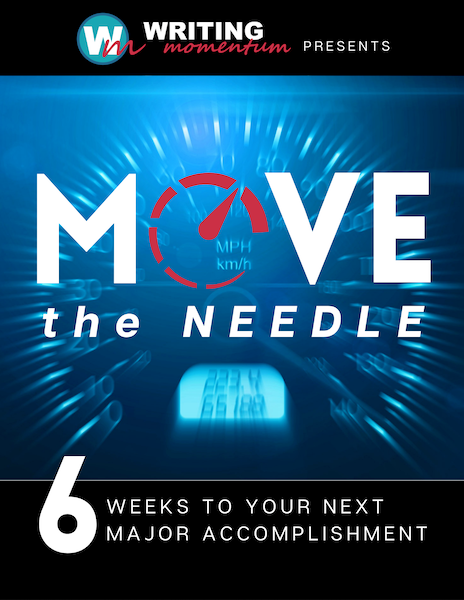Episode 98
The Importance of the First Chapter with Melanie Hemry
The first chapter of any book is crucial for capturing the reader's interest and keeping them engaged throughout the book. It is important to establish a clear premise, answer basic questions, set the tone and mood, and use storytelling techniques effectively. By doing so, the author can engage the reader, establish credibility, and deliver on the promise of the book's title.
LINKS:
- melaniehemry@gmail.com
- Liz Wilcox's Email Marketing Membership at http://wmdeal.com/liz
- Get your FREE Move the Needle goal-setting for authors ebook at https://www.writingmomentum.com
- Write with us! Join Chris, Gena, and Rene each Wednesday at noon Central and let's get our writing DONE! https://www.writingmoments.com
Transcript
Hi, and welcome to the Writing Momentum Podcast.
Speaker:I'm Gena Maselli, and I'm here with my husband, Christopher Maselli.
Speaker:Hey, so good to see y'all.
Speaker:Yeah.
Speaker:We are super excited because we have one of our favorite writers joining us today.
Speaker:We have an interview today with Melanie Hemry.
Speaker:Yes.
Speaker:She is an award-winning author of more than 60 books, and many
Speaker:of them are ghost written, so she spends a lot of time with helping
Speaker:other people get their message out.
Speaker:And her book that she's probably best known for, I guess for now is The
Speaker:Jerry Falwell His Life and Legacy but she's also the award-winning author
Speaker:who has written for Guidepost and has won their prestigious writing award
Speaker:and their annual contest as well as she has written for Reader's Digest and
Speaker:Believers' Voice of Victory Magazine.
Speaker:So welcome, Melanie.
Speaker:Thank you so much for coming.
Speaker:Welcome, welcome.
Speaker:Thank you for having me.
Speaker:I'll tell you, I'm looking forward to it.
Speaker:'cause last time you were here, we talked about interviewing.
Speaker:And it was such a rich interview, so deep in depth and so it's just,
Speaker:it's always good to talk to you.
Speaker:And today we are talking about another topic that Melanie and I have talked
Speaker:about before, and I think this is so good.
Speaker:I really wanted to have her on here to hear her speak about this.
Speaker:And this is about the first chapter of a nonfiction book.
Speaker:That chapter is so important.
Speaker:And Melanie, you tell us from your perspective, why
Speaker:is that chapter so important?
Speaker:There's so many things that have to happen in the first chapter of a
Speaker:book for the reader to keep reading or want to know what happens next.
Speaker:And if you don't do that, I think a lot of new writers are not understanding
Speaker:how to do that first chapter and then they lose their reader.
Speaker:Doesn't mean the book won't be sold because there are books
Speaker:being sold by good writers.
Speaker:That doesn't mean they're being read.
Speaker:That's right.
Speaker:All the way through the chapter one and start on chapter two and keep going.
Speaker:But I always think of his book as a pyramid, and that chapter one is
Speaker:the foundation of the whole thing.
Speaker:And you've gotta get a lot of things done in there.
Speaker:I would say that the thing that I see most often that's wrong is that a writer
Speaker:will think, what do I wanna write about?
Speaker:I think I'll write about this.
Speaker:And they're basing it on what they wanna write about, not basing it on the
Speaker:need of the reader, because all that's gotta be established in chapter one.
Speaker:What I feel like has happened is things changed with social media, you
Speaker:can no longer write long sentences.
Speaker:You can no longer write long paragraphs because they're not gonna read them.
Speaker:Like I said, it might, but, it's just not gonna happen anymore.
Speaker:But what seems to be gotten thrown out along there someway
Speaker:is putting a premise in a book.
Speaker:Remember that old thing we learned in school about writing a premise?
Speaker:we still gotta do that.
Speaker:Social media did not change that you need a premise for your book.
Speaker:But if you look at the things that need to be established in chapter one.
Speaker:You've gotta answer the basic questions, who, what, when, where, and why.
Speaker:That still has to happen.
Speaker:And somewhere in chapter one, you've got to get the reader to
Speaker:care about what's happening in this book, because if they don't care,
Speaker:they're not gonna stick with it.
Speaker:You've gotta set the tone for the book, which we'll go into.
Speaker:You've gotta set the mood for the book.
Speaker:You've gotta provide a platform and establish credibility for somebody that's
Speaker:reading for whoever wrote the book.
Speaker:You've gotta make a nonverbal contract with the reader that you're gonna
Speaker:solve the story problem if they will finish the reading the book.
Speaker:And you've got to establish that premise, and then you've gotta
Speaker:make 'em so interested they want to turn the page to chapter two.
Speaker:Yeah.
Speaker:Yeah.
Speaker:That's alot to accomplish.
Speaker:It is.
Speaker:It is and I feel guilty of this myself where I wondered, is it
Speaker:'cause I'm getting older or because times have changed or whatever.
Speaker:But I will pick up books and as much as I love reading.
Speaker:There's many times if those, especially nonfiction books, if they don't
Speaker:capture my attention in that first chapter, it's okay, I don't wanna spend
Speaker:another 14 hours reading this book.
Speaker:I'm gonna move on to something else.
Speaker:But there is a definite something, and we can get into that even more here,
Speaker:that's in the books that work, that capture your attention, that make you
Speaker:go, okay, I'm gonna keep going on with this because this is right where I'm at.
Speaker:This is what I need to know the answer to what they promised there in the beginning.
Speaker:As opposed to just feeling okay, so you're just laying something out here
Speaker:and I just have to go with you for the ride and sometimes I just don't
Speaker:feel like I have the time for it.
Speaker:I think there's definitely, and we've talked about that on this podcast
Speaker:before, that people sometimes they don't know who their reader is.
Speaker:Or what that felt need of that person is, and so they just scattershot it.
Speaker:And they throw everything against the wall.
Speaker:They wanna talk about this topic, but instead of really narrowing down who
Speaker:it is they're talking to and what the core message that they're trying to get
Speaker:across, they do the scattershot thing.
Speaker:And I know all of us have probably read books where you just don't even
Speaker:know where it's going or who it's written for, because the person didn't
Speaker:do some of that work ahead of time.
Speaker:So can you think of, I'm putting you on the spot here, but can
Speaker:you think of an example of a felt need that is clearly defined so
Speaker:that someone might keep reading?
Speaker:Okay, let's talk about that for a minute, because years ago,
Speaker:I wrote a book for a pastor.
Speaker:I was, he had multiple ghost writers at the time, and he assigned me
Speaker:to write his book on fatherhood, and it was like a 12 or 15 set CD
Speaker:series of sermon he'd preached.
Speaker:Now his premise was that fatherlessness is the cause of all ills.
Speaker:In society, okay, he had a lot of supporting scripture, but we both
Speaker:know there is not one scripture that says Yeah, fatherlessness
Speaker:is the cause of all the ills.
Speaker:Whoever was doing the book on motherhood, they just took his
Speaker:transcript and laid it down.
Speaker:Tried to pretend it was a book.
Speaker:It took me much longer because I won't go past chapter one
Speaker:until I've got that nailed.
Speaker:And I thought, how are you gonna do it if I don't, it's a Christian book and
Speaker:I don't have a scripture to stand on.
Speaker:I thought, I've got to do research in society and see
Speaker:what society says about that.
Speaker:Now, do you care if I just read a little bit about that first chapter?
Speaker:No.
Speaker:No.
Speaker:Go for it.
Speaker:Sure, go for it.
Speaker:Okay, so let me just say that this was written back before social media
Speaker:and the sentences are too long.
Speaker:Would never write 'em this long today.
Speaker:So on the first chapter, knowing what all had to be done, this is how I started.
Speaker:This was, by the way, not too long after Katrina.
Speaker:Okay.
Speaker:Blistering Sun shimmered off the water that flooded New Orleans
Speaker:in the wake of Hurricane Katrina.
Speaker:It was an eerie sight as choppers circled overhead looking for survivors.
Speaker:The word help was spelled out on one roof.
Speaker:The rest of the house was underwater, bloated bodies floated in the floodwaters
Speaker:of a city, which once vibrated with life.
Speaker:Survivors climb to the highest point in hopes of rescue.
Speaker:These are the effects of a natural disaster.
Speaker:Sniper fire drove away the rescue team attempting to
Speaker:evacuate the charity hospital.
Speaker:As a result, more people died.
Speaker:Teenage boys traveled in packs preying on hopeless people.
Speaker:Officials from the Federal Emergency Management Agency suspended rescue
Speaker:efforts in parts of New Orleans, where relief workers met violence.
Speaker:Up to eight gun stores were looted.
Speaker:The guns and ammunition were turned on survivors and rescue workers.
Speaker:Smoke and fire swirled above the water as arsonists set parts of the city ablaze.
Speaker:These are the effects of a human disaster.
Speaker:Why would people prey on helpless homeless survivors of a tragedy
Speaker:like the one that hit New Orleans?
Speaker:The answer, of course, is that those people need God, but
Speaker:that wasn't the only answer.
Speaker:Many of the people in New Orleans who weren't Christian risked
Speaker:their lives to save other people.
Speaker:They gave up their bread and water for the young, the old and the lame.
Speaker:So what went wrong in the internal wiring of those who shot at rescue
Speaker:workers attempting to evacuate, dying people from Charity Hospital.
Speaker:Strange as it may seem, we get a glimpse of the answer in Africa at the
Speaker:Pilanesberg Reserve Park in South Africa.
Speaker:Teenage elephants, usually docile went on a reign of terror in 1993,
Speaker:1 young elephant killed two people.
Speaker:A year later, young male elephants killed 21 white rhinos.
Speaker:Two years later, another 20 rhinos were killed.
Speaker:In 1997, a young male elephant was caught in the act of killing a rhino.
Speaker:What happened to change these usually docile animals into killers?
Speaker:18 elephants had been orphaned and were released into the park in 1980.
Speaker:They had no adult role models, male or female, and within two years, the
Speaker:aggressive destruction behavior had begun.
Speaker:Adult females were released into the park, but the behavior not
Speaker:only continued, it worsened.
Speaker:Elephant behaviorist, then introduced six mature male bull
Speaker:elephants into the reserve.
Speaker:Once each of those six bulls had encountered every elephant in
Speaker:the park, the killing stopped and the behavior changed.
Speaker:So from there, I won't read the whole chapter, but from there I
Speaker:went through lots of research, just making my point so clear.
Speaker:For instance, let me see.
Speaker:In one study, 85% of children who exhibit behavior disorders
Speaker:are from fatherless homes.
Speaker:85% of rapists motivated with displaced anger come from fatherless home.
Speaker:71% of all high school dropouts come from fatherless homes, 75% of all
Speaker:adolescent patients in chemical abuse centers come from fatherless homes.
Speaker:70% of juveniles in state operated institution come from fatherless home.
Speaker:85% of all use in prison come from fatherless homes.
Speaker:So I just took this chapter and I hit the reason hard.
Speaker:Now, what we've said you've gotta do in the first chapter also is establish
Speaker:your contract with the reader.
Speaker:Now, normally the contract is unspoken.
Speaker:Even in guideposts story you establish your unspoken contract with the reader.
Speaker:It used to be in the first paragraph, but now that the first paragraphs
Speaker:are so tiny, I may not get to till the third paragraph, but your story
Speaker:problem is an unspoken promise that by the end of the story, you will show
Speaker:'em how this can be solved, right?
Speaker:I felt like with this premise being what it was that I needed to.
Speaker:Actually make this promise, not unspoken, but spoken.
Speaker:So let me tell you how I ended that chapter.
Speaker:Once you grab hold of a principle of God, it's like finding a vein of gold.
Speaker:You wanna keep right on digging.
Speaker:Fatherhood is a vein of gold that God has given to the body of Christ.
Speaker:It may be the single area that the devil has fought for more
Speaker:than any other in our lives.
Speaker:The devil wants our children, our families, and our destinies, but
Speaker:he's not going to get them because I'm gonna teach you God's equation.
Speaker:That's so good.
Speaker:Good.
Speaker:See that?
Speaker:It does.
Speaker:It makes you go how can I not turn the page to chapter two?
Speaker:Because you're convinced of.
Speaker:This is the problem.
Speaker:This is exactly what I was looking to find the answer for.
Speaker:And you're gonna show it to me now.
Speaker:Yeah.
Speaker:I've called it before, casting the vision.
Speaker:When you're talking in the first chapter, you talk about having that contract.
Speaker:I don't know where I came up with that or heard it or whatever, but it's that
Speaker:casting the vision for where are you gonna take the reader by the end of the book.
Speaker:I love that.
Speaker:I love that.
Speaker:He had been put out with me 'cause it took me a long time
Speaker:to get Chapter one figured out.
Speaker:The rest of the book went pretty good afterwards.
Speaker:But when I sent it to him, he called me and he said, no one
Speaker:else will ever write for me again.
Speaker:He never knew what goes in the first chapter.
Speaker:He never knew that I established a platform for him, that I set up a
Speaker:premise that they could not ignore.
Speaker:But all he knew was that I did a really good job.
Speaker:Yeah.
Speaker:Yeah.
Speaker:And we talk about that too, because you also established his authority
Speaker:and like you said, he's a pastor, so you could have pulled from scripture,
Speaker:but because there isn't a succinct scripture that outlined his premise, I
Speaker:love that you were still pulling from those you're pulling from the society.
Speaker:So you're bringing that evidence from the society to bring it in.
Speaker:I would think even if there was a scripture that was succinct and said
Speaker:that having all of the statistics and the real life here's what we see
Speaker:and, support that scripture would just continues to make the case.
Speaker:And it's just, it makes it so much more compelling rather than just.
Speaker:Rather than, just a single scripture, and that's powerful.
Speaker:The book, of course, I brought in scriptures to support it.
Speaker:Yeah sure.
Speaker:The premise had to be really nailed in that first chapter, especially when we
Speaker:didn't have a clear one supported one scripture that everything could stand on.
Speaker:And also you used the power of story in that first chapter as well.
Speaker:So it wasn't just that you were preaching at the reader, you're actually letting
Speaker:the reader, you're guiding the reader toward that conclusion with these stories.
Speaker:Which is so powerful too.
Speaker:I always like to begin every chapter, even in a teaching book with scenes.
Speaker:Story that's going to depict what I'm showing in that chapter.
Speaker:I think so too.
Speaker:'cause I think people love that they, I they get caught up in the story.
Speaker:They just get caught up in it.
Speaker:And I know Chris and I worked on a book a few years ago where it was
Speaker:actually a therapist who was saying that with story, that story gets
Speaker:beyond our initial mental blocks.
Speaker:Story goes deeper.
Speaker:It breaks down the walls, I guess that we might put up between
Speaker:us and whatever we're reading.
Speaker:And whatever is being taught to us.
Speaker:So if we're being taught, we might automatically have this
Speaker:idea of, no that's not right.
Speaker:Or we might wanna combat it.
Speaker:But when we hear those stories, the stories go deeper.
Speaker:They automatically go deeper.
Speaker:I wanna just touch on one thing you said earlier, Gena, and that is that
Speaker:we didn't preach in that chapter.
Speaker:I think another thing is people wanna go to church and hear a sermon they
Speaker:don't wanna be preached at in a book.
Speaker:A big mistake new writers make is trying to preach.
Speaker:Yes.
Speaker:Doesn't work.
Speaker:It doesn't work.
Speaker:Yeah, exactly.
Speaker:Definitely.
Speaker:So some other things that have to be done.
Speaker:I said, who, what, where, when, and why.
Speaker:You also need to set the tone of your book, and you want it
Speaker:to be, very conversational.
Speaker:For instance.
Speaker:Okay, this is a true story, a nonfiction book called Out of the Depths.
Speaker:It's a Rabbi in Israel who wrote a book about his experiences, and I
Speaker:wanna read you the first two sentences.
Speaker:My father's standing at the deportation point.
Speaker:That is the first childhood memory engraved in my mind.
Speaker:It is the image that accompanies me wherever I go.
Speaker:It is the autumn of 1942.
Speaker:I am five years old, short and terrified.
Speaker:Now, so, Two sentences.
Speaker:He set the time, place, and he set the mood.
Speaker:Here's one.
Speaker:This is fiction, but I think it does a great job of setting a mood.
Speaker:This is Janet Evanovich in my mind, my kitchen is filled with
Speaker:crackers and cheese, roast chicken leftovers, farm fresh eggs and
Speaker:coffee beans, ready to grind.
Speaker:The reality is that I keep my Smiths and Wesson in the cookie jar, my
Speaker:Oreos in the microwave, a jar of peanut butter and a hamster food in
Speaker:the over of the counter cupboard.
Speaker:I have beer and olives in the refrigerator.
Speaker:I used to have a birthday cake in the freezer for emergencies, but I ate it.
Speaker:I love that.
Speaker:That's a photograph that sets a mood and makes you laugh.
Speaker:So how you write that lead.
Speaker:In that first chapter, it's gonna set the mood for what you wanna share in the book.
Speaker:So good.
Speaker:And another thing you have to do is you need to set the platform.
Speaker:This pastor on this book that I wrote on fatherhood, had a huge church in
Speaker:Philadelphia and he had a big TV program.
Speaker:But here's what I know.
Speaker:The people reading that book would be all over America and all over the world, and
Speaker:they weren't gonna be limited to that.
Speaker:And you can't, you have a certain authority when you step up to a pulpit.
Speaker:So I had to, in that first chapter, give him the credibility.
Speaker:So if they had never heard his name before, they believe he
Speaker:knew what he was talking about.
Speaker:So that's establishing the platform.
Speaker:And then we always already talked about making that contract with the reader, but
Speaker:I really think that the biggest thing of all of it is establishing that premise.
Speaker:I see a lot of books coming out.
Speaker:They have no premise.
Speaker:It just got left out.
Speaker:And can you talk just quickly about this, because I know we've talked about
Speaker:this and your process for coming up with that, narrowing down that premise.
Speaker:You have a specific process that you go through for that, which is so helpful.
Speaker:I really think that it is different on every book, but just like I did on this
Speaker:book, I realize, and I will say this, as a ghost writer, you may be given.
Speaker:15, 20 sermons.
Speaker:First chapter is usually not in there.
Speaker:'cause you don't have to do all the things that are required
Speaker:in a first chapter in a sermon.
Speaker:So almost no matter what the book is, I have to write a first chapter that
Speaker:does what that book's gonna need.
Speaker:But on this one, I just realized I was gonna have to go to society for research.
Speaker:You just have to figure out what problem is this book gonna solve for the reader?
Speaker:And how do we set that up in the first chapter that we make that clear?
Speaker:That this is what's going on in your life, that this book can help.
Speaker:So you really have to dig in generally and do research because.
Speaker:Like I said, the books that I write for pastors, they generally don't have that.
Speaker:Occasionally, somewhere through the sermon, there might be some stories
Speaker:that can go in the first chapter.
Speaker:But generally the first chapter information isn't there.
Speaker:So I always try to narrow down.
Speaker:What is the real story problem?
Speaker:And what is the reader gonna get out of this book?
Speaker:And that's the premise you're gonna establish in that first chapter.
Speaker:That's so good.
Speaker:Really good.
Speaker:Once again, talking to Melanie Hemry here, and I just wanted
Speaker:to take notes the whole time.
Speaker:I'm gonna have to listen to this again.
Speaker:It's so good.
Speaker:It's really good.
Speaker:Thank you so much.
Speaker:I really do believe that the first chapter is what is keeping
Speaker:a lot of books from selling.
Speaker:And the rest of it may be great, but if you haven't done your work
Speaker:in the first chapter, it really hurts people from understanding
Speaker:what am I gonna get out of this?
Speaker:'cause if I'm gonna commit so many hours of my life to reading
Speaker:this book, what, what for?
Speaker:Yeah and I imagine that first chapter also has to make good on the promise
Speaker:of the title of the book, right?
Speaker:Because we're all downloading our books now, so a lot of times if you're
Speaker:looking for a certain subject like the Fatherlessness or something like
Speaker:that, you might, something about that title might have caught your eye.
Speaker:You're gonna download it, you're gonna grab it off a bookshelf, and then
Speaker:you've got one chapter to make good on the promise of what that title
Speaker:is and get that reader completely just hooked on what you're writing.
Speaker:This is a little rabbit trail, but the interview I did was about a
Speaker:man who had been homeless on the street, a drug addict, but when I
Speaker:was contacting him to try to set an interview, his flying all over Africa.
Speaker:So I said, what were you getting in Africa?
Speaker:And he goes, oh we're setting up our programs to help the problem
Speaker:of fatherlessness like we do in the United States in Africa.
Speaker:Wow.
Speaker:Wow.
Speaker:How cool is that?
Speaker:What a legacy.
Speaker:Yes.
Speaker:Yes.
Speaker:Thank you Melanie, for joining us again and talking to us about first chapters.
Speaker:Like I said I'm gonna go back and listen to this one again for sure.
Speaker:Thank you so much.
Speaker:Thank you so much for joining us today.
Speaker:If you enjoyed this podcast, please rate, review, subscribe
Speaker:and share it with someone who's writing their nonfiction book.
Speaker:I really encourage you to check that out.
Speaker:And if you missed our interview with Melanie on interviewing I encourage
Speaker:you to go back and listen to that as well, because if you are writing
Speaker:nonfiction books and you're needing to get some social proof from other
Speaker:people and hear their stories and bring those in, she's got some really
Speaker:great insight on that topic as well.
Speaker:Yes.
Speaker:So thank you so much for joining us.
Speaker:Thank you for joining us, Melanie.
Speaker:Hey, you know we're all not in this alone.
Speaker:That's right.
Speaker:That's why we do this kind of thing, and don't forget that together.
Speaker:We have writing momentum.
Speaker:Bye.





